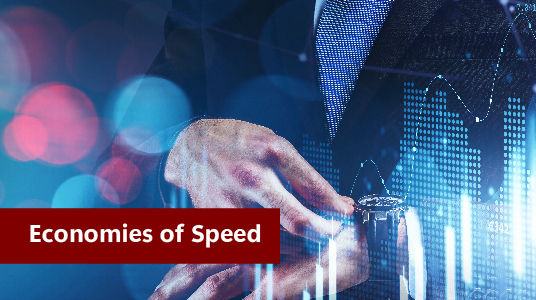“Capitalism has a new denominator. It’s not capital, it’s TIME.”
Economies of scale were the battlegrounds where big-league players like General Motors and Ford won and established the old-world order of business.
However, network natives like Amazon are disrupting the top order through Economies of Speed – using speed to deliver an engaging customer experience and dominate the marketplace. In the past, pioneers like GM and Ford or Walmart and Target battled it out over the Economies of Scale derived from being capital-efficient for a certain amount of output. In the process, they used scale to deliver products/services while optimizing capital. This was the success mantra when consumers focused majorly on the availability and choice of products.
Today, customers are more conditioned to focus on their ‘buying experience’ than the product/service itself. Today, Walmart and Amazon, or Amazon and Microsoft, find themselves locked in a fierce competition that revolves around a metric – Economies of Speed. They use speed to deliver a memorable ‘experience’ by optimizing for time. As a result, the science of experience has taken center stage among business priorities.
Economies of Speed and Economies of Scale differ fundamentally in terms of the perceived outcomes. Economies of Scale demand efficient use of resources with a Return on Investment (ROI) mindset. But Economies of Speed require a Return on Options mindset. While the ROI mindset triggers a single-minded pursuit of efficiency, the Return on Options mindset will combine inefficient exploration with efficient exploitation as the core processes to achieve said economies.
Dhiraj explains, “In the past, it was about getting the strategy right and then executing it whole project in the right direction that you have chosen. Today, exploration happens throughout the execution. It’s about having a culture that accepts failure as a part of the journey and continuously learning. That’s how culture eats strategy today.”
Large businesses are often reluctant to budget for exploration through experimentation, given the uncertainty that’s characteristic of the exercise. Yet Mu Sigma, having served as a steadfast partner in driving key transformation initiatives, has repeatedly and successfully applied the Art of Problem-Solving (AoPS) which is based on the fundamental belief of extreme experimentation.
Networks form the backbone of the new champions in this business landscape since Economies of Speed are driven by the momentum of networks. As Dhiraj puts it, “The ‘Software eats the World’ paradigm has allowed businesses to become networks. As a result, we have been propelled to the ‘Network Eats the World’ paradigm. The top ten companies in Fortune 500 by market capitalization, from Amazon to Alibaba, are either Network natives or acclimatized to becoming networks.”
It’s important to understand how they found success, though. The Network Natives were conceived in the era of ‘Network Eats the World’. So, Economies of Speed became their natural choice to claim a competitive edge. They aren’t burdened by the liabilities of past successes achieved through Economies of Scale, and they weren’t modeled for this older paradigm.
On the other hand, the Non-network Natives must disrupt an old framework and scale a new mountain, the Economies of Speed. Their path to the top must be vastly different from that of Network Natives. Inefficient exploration and efficient exploitation will play a huge role in their strategy to unlearn the principles of Economies of Scale and internalize those of Economies of Speed.
Since Economies of Speed revolve around creating a seamless customer experience through time optimization, one needs to explore the science of time to perfect the science of experience. While studying time, we need to focus on the present and capitalize on this instant.
At present, time is of the essence – to economize, to explore inefficiently, and to exploit efficiently.
“We have all grown up being taught that “time is money”, maybe we will grow old believing that “money is actually time.”


